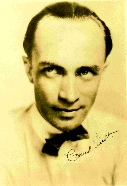
The Conrad Veidt Society
READERS have sent suggestions for roles for Conrad Veidt. Hubert Cole sums up their views and presents Mr. Veidt's replies.
When I wrote an article about Conrad Veidt a few weeks ago, I rashly suggested at the end of it that readers might like to send in their own ideas on the kind of parts that Veidt should play.
The result of that tentative suggestion has astounded me, Mr. Veidt, and probably the Post Master General. The number of letters that arrived must have set some sort of record.
The fact is even more striking because, as far as I know, there is no organized Conrad Veidt fan club. With lots of stars, any mention of their work (especially an adverse one) brings a sheaf of replies from the members of their fan clubs, anxious to praise or defend them.
Yet, lacking this organization, Veidt's appeal is so great that the Martlett House postman nearly gets his back broken and I get a slight case of eyestrain from reading scores of letters.
If I ever hoped that these letters would provide a solution to the problem of what parts Veidt should play, I was sadly mistaken. The views are as varied as the roles that Veidt has played in the past, and are often expressed with great vehemence.
Some people chided me very roughly for wishing Veidt to play villainous characters at a time when the world has more than enough villainy to go round. Others agreed wholeheartedly with the lady who wrote: '''Better or worse?' Here's one filmgoer who says, firmly if ungrammatically, 'worser and worser.'''
Most frequently mentioned of his films were Rome Express, his first British-
There was strong support, too, for I Was A Spy and The Spy in Black, while one reader pointed to the brief glimpses of comedy in some of Veidt's recent pictures and asked, ''If Garbo goes comic in Ninotchka, why shouldn't Veidt?'' Conrad Veidt as a polished comedian certainly seems to be an idea.
As for hte concrete suggestions of roles, they came in such a bewildering and indigestible
richness that I can mention only a few. They ranged form Cesare Borgia to Pastor
Niemoeller, from Anthony (in ''Anthony and Cleopatra'') to Thomas Carlyle. That last
one, with Veidt speaking in a mixture of German and Scottish accents, sounds a little
peculiar -
Then there was Wallenstein (an excellent suggestion, I think), Ribbentrop (a chance for Veidt to show how really nasty he can be,'') Cyrando de Bergerac, and the commander of the Polish submarine which slipped through the Baltic and joined the British Navy.
Oscar Wilde's ''Portrait of Dorian Grey'' was another proposal, largely because of its similarity in theme to The Student of Prague, two readers mentioned the part of Arbaces in ''The Last Days of Pompeii, and others, comparing Veidt with Irving, proposed ''The Bells,'' and ''The Lyons Mail.''
For the rest, there were Kemal Ataturk, any one of the many famous Norwegian explorers, a corsair, William the Silent, Marat and Cagliostro. On the whole, the characters suggested veered just a little more towards villains than heroes. But not enough to make much odds.
And what does Conrad Veidt think about all this? He spent hours reading and sorting the letters. Here are his own comments on them:
''I was astonished and immensely flattered to find that so many readers of PICTUREGOER AND FILM WEEKLY were kind enough to send suggestions for parts that I should play.
It is true that the opinions were so varied that it was impossible to reduce them to one definite factor, yet I suspect that they were all the more encouraging and helpful because of that.
These letters, with their wide variety and completely diverging points of view, prove
that the audience is always more rich in character than even the greatest actor -
The actor cannot please all of the audience all of the time; it is equally true that he cannot dispease all of the audience all of the time. So that even the pictures which the majority of filmgoers have thought my worst have been popular with some.
It is the strange variety in public taste which makes the actor's job so baffling yet enthralling.
Of the specific suggestoins which you have made, many had occurred to me before. Others I have noted gratefully, in the hope that I may later find an opportunity to play them.
But there are so many obstacles to bringing what appears to be even the most perfect role to the screen, that it would be useless for me to commit myself to playing any one of htem. No actor can make a good picture without a good story. Still more important, no role is a good role which gies the acotr prominence.
I still hope to appear as Novel, and I was delighted to read that many of you agree
that Nobel's life would make a fine story for me. Apart from that, I am ready to
be either villain or hero -
Thank you once more for the great kindness you have shwon, and the great help your letters have given me.''
Picture Goer and Film Weekly, Spring 1940
Conrad Veidt Replies